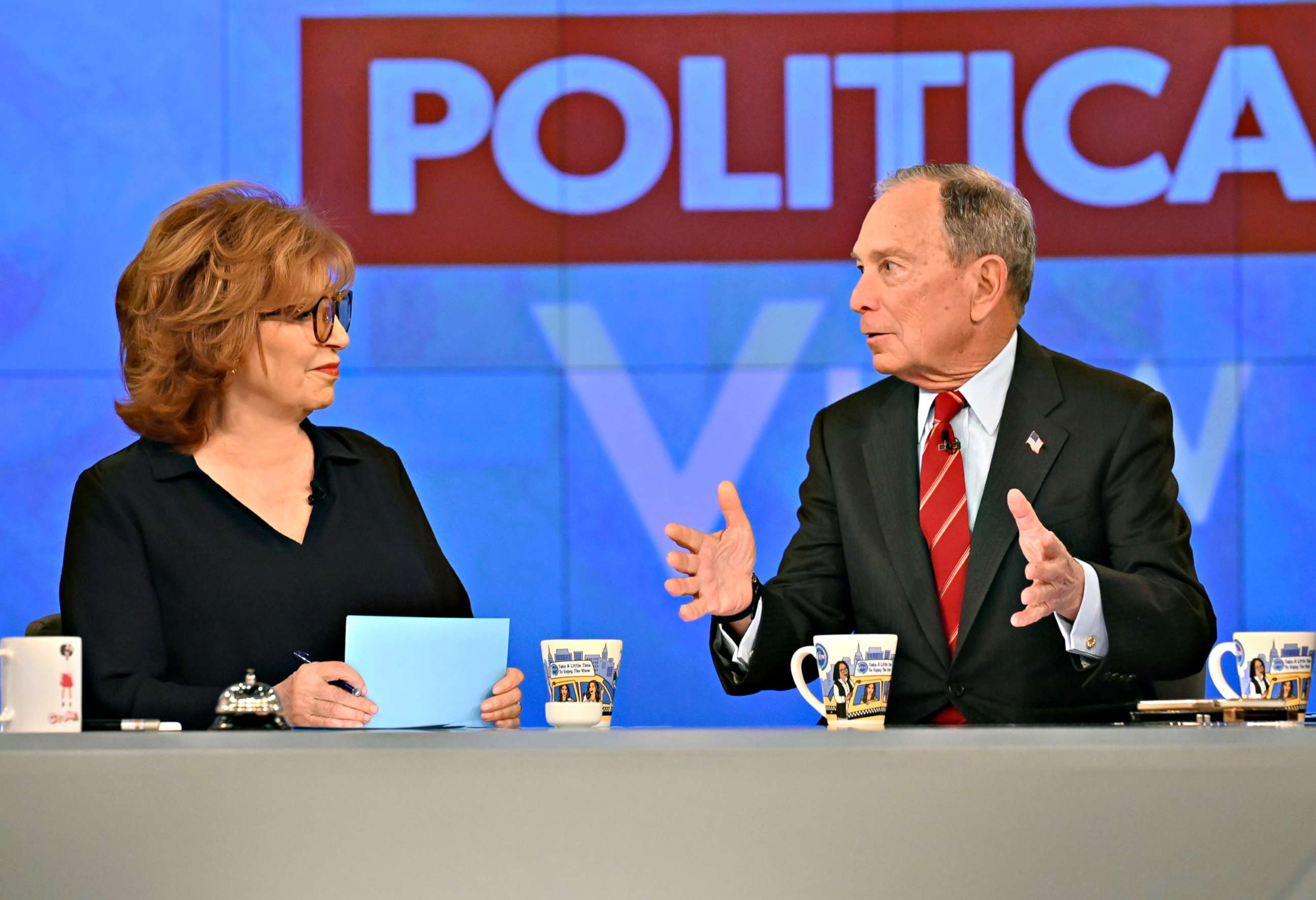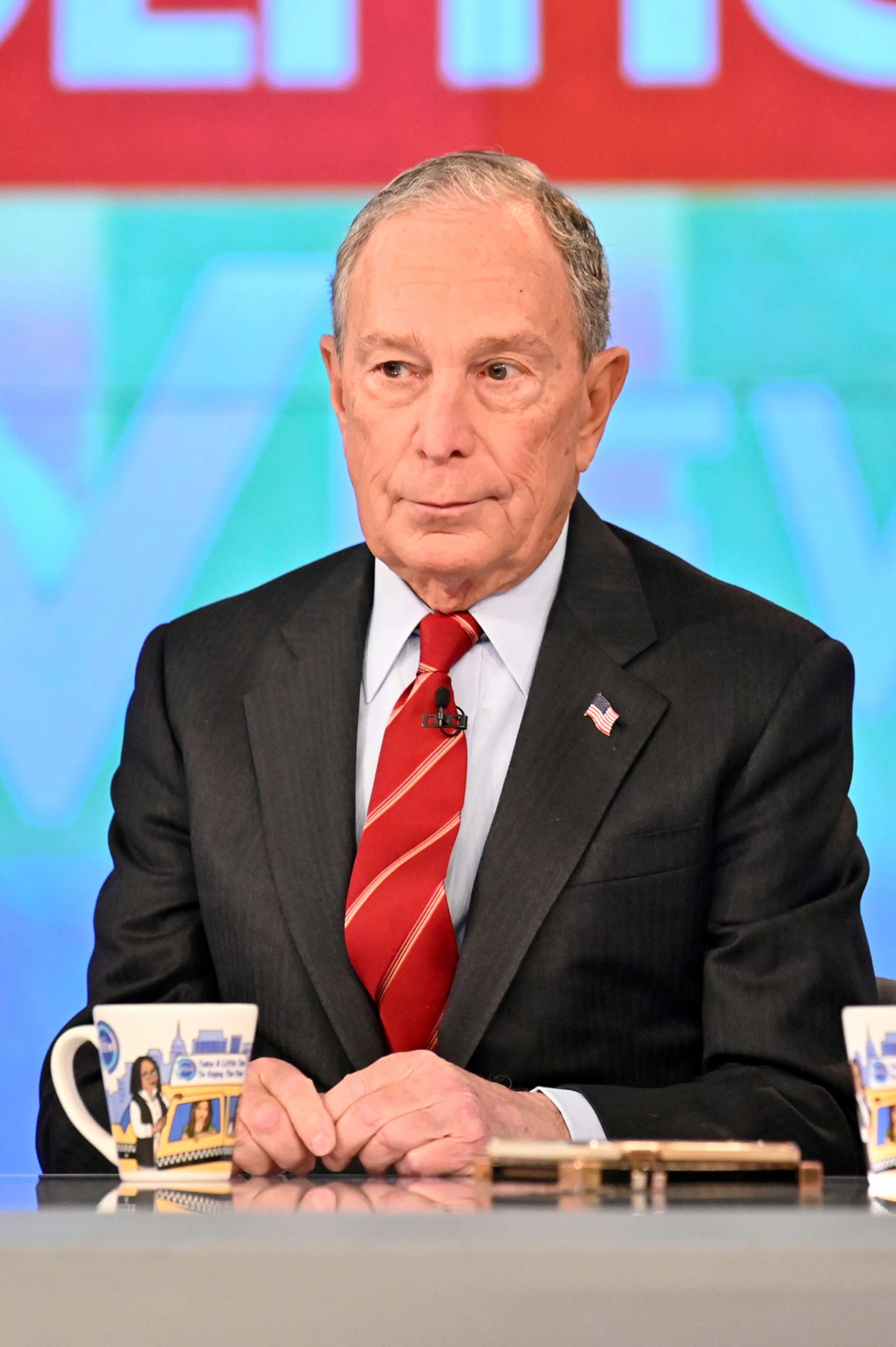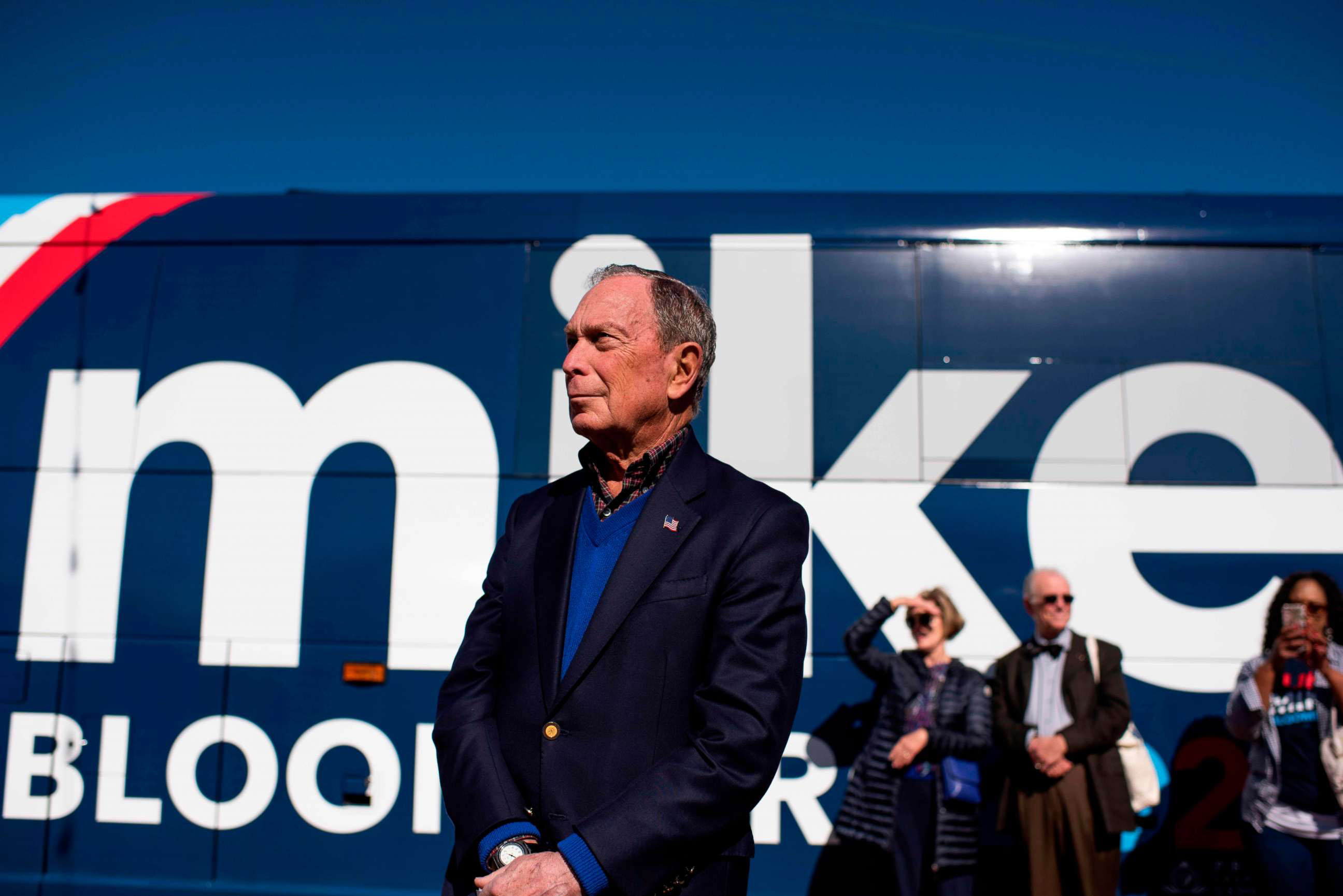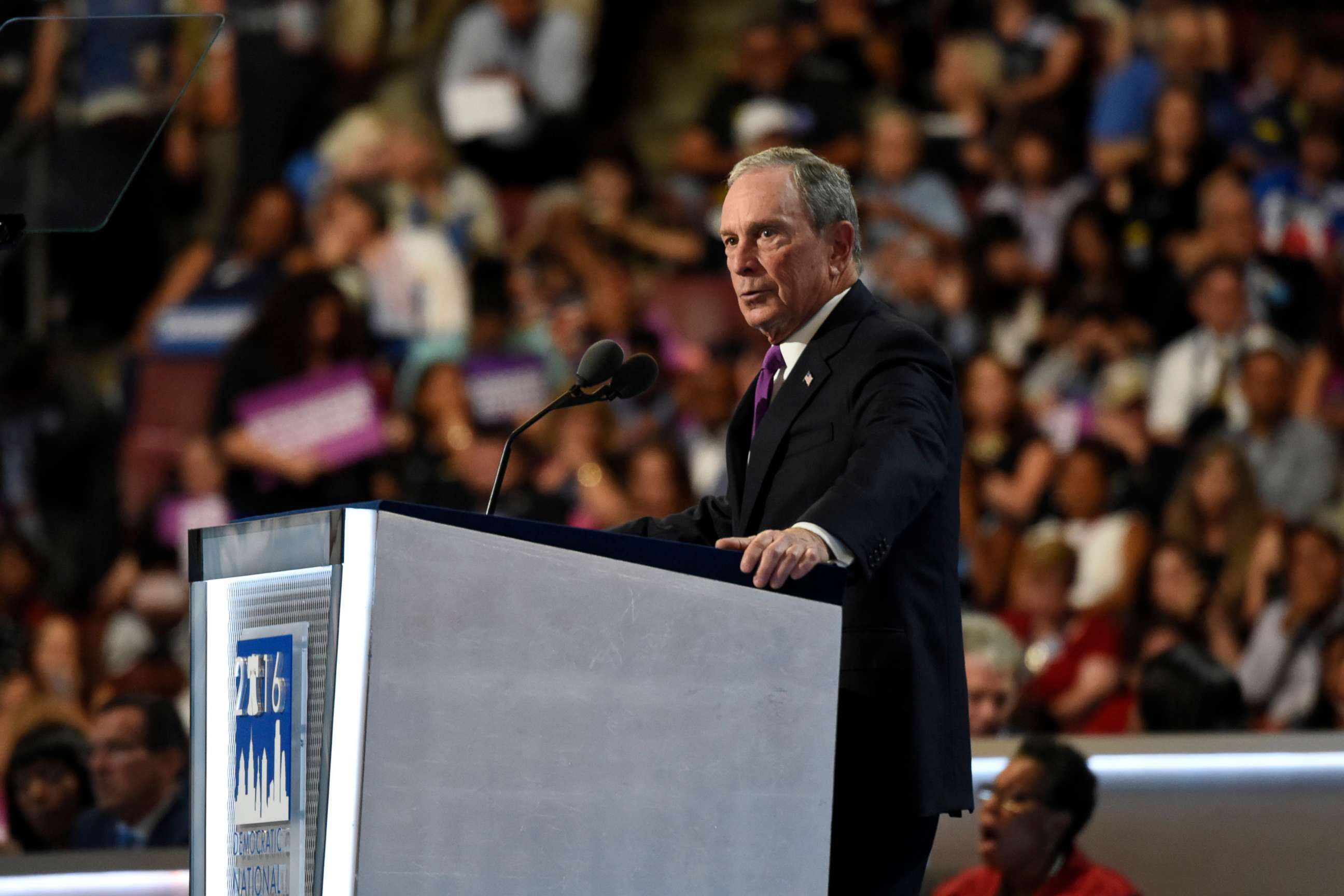Bloomberg says he would join 'good theater' debates, but touts self-funded campaign
Bloomberg says if a candidate can afford to self-fund, "you should."
Billionaire Michael Bloomberg makes his first appearance as a 2020 presidential candidate on ABC's "The View" Wednesday, saying he would have liked to be on last night's debate stage, but doesn't want to take people's money.
"If you can afford to be self-funding ... you should," said Bloomberg, who joined the race late in the game, jumping into the thicket in late November .
After last night's debate, many of the other candidates are still in Iowa, trying to draw in more support as the caucuses get closer.
Bloomberg said from the beginning of his race that he would be self-funding his campaign -- without the help of donations -- which ultimately disqualifies him for participating on the debate stages. Though, he did concede that it's harder to get a candidate's message out without being on the stage.
He said he watched the debate, however, and didn't feel he learned anything new from last night's debate, but called it "good theater."

"I suppose it's good theater but didn't address the issues of the country ... they're not really debates, they're pre-canned soundbites," Bloomberg said. "We should think about another format where somebody picks a subject and they have to talk about that subject."
He may not have been on the debate stage, but his staff made sure Bloomberg was still talked about -- even posting a series of odd tweets to help the people get "to know him better."
For example, one Twitter post said: "Test your political knowledge: SPOT THE MEATBALL THAT LOOKS LIKE MIKE" with an image of a plate of meatballs, and his face depicted on one of them."
The Twitter series ended with a video of President Donald Trump at his Wisconsin rally touting his win in the state with a message from Bloomberg's team.
"Now that my team @mike2020 has your attention, I think it's important that you see what @realDonaldTrump said to voters in Wisconsin tonight. Battleground states like Wisconsin will decide the 2020 election. This is not a joke," the post said.
The former New York mayor is also taking a dramatically different approach by skipping the first four primary and caucus states: Iowa, New Hampshire, South Carolina and Nevada. His name will not appear on the ballot in these states.

"That is not by choice, I thought about running ... a lot of candidates had ideas that didn't make sense ... I watched them and said 'can they beat Donald Trump?" Bloomberg said, adding that he felt he had no choice but to jump in. "It was too late to build a ground operation in the four early states."
Instead, he's pouring resources into Super Tuesday states -- such as Texas, California and Florida -- and is calling to change the primary voting calendar to prioritize these battleground states before Iowa and New Hampshire.
"I hope the DNC changes its rules -- I’d gladly participate -- but I’m not going to change my principles," Bloomberg wrote in a CNN editorial this week. "So I’m traveling the country taking my message directly to voters -- and as a result, President Trump is now finally facing opposition from a candidate in the battleground states."
Democratic National Committee Chairman Tom Perez responded to the criticism on Tuesday in an episode of CNN's "New Day."
"I think these four early primaries are really good opportunities for people to get to know candidates, for candidates to get to garner momentum," Perez told CNN, adding "If you have your first state be a really large state, then what you're going to do if you do that is you're going to reward people who have deep pockets."
Perez wouldn't say if his comments were directly aimed at Bloomberg, but the resources he -- and other candidates such as businessman Tom Steyer and entrepreneur Andrew Yang -- has already poured into the race is overshadowing the other candidates.
"What we want to do is make sure our early states are accessible to all the candidates and our early states give opportunities across the board," he said.
Massachusetts Sen. Elizabeth Warren and former candidate New Jersey Sen. Cory Booker -- who suspended his campaign on Monday -- have consistently taken aim at the ultra rich class and lack of diversity in the race.
He has even faced skepticism from his fellow 2020 contenders on how he has leveraged his wealth -- especially his large ad buys -- some accusing him of “buying his way” into the election.

On Tuesday, Bloomberg's campaign announced they have grown to 1,000 staffers, with over 700 field staff fanned out across 33 states.
His campaign also bought a 60-second Super Bowl ad, which Fox News executives have described as "north of $5 million" for two 30-second slots.
He has also already pushed past the $200 million mark on ad spending and has pledged that even if he does not take the nomination, he and his vast assets will stay in the race to boost whoever does.
Bloomberg also reiterated the regret he's expressed on the now-notorious Stop-and-Frisk policy in New York City -- a controversial policy that was ruled unconstitutional by a federal judge for being racially discriminatory -- which during his tenure as mayor he vehemently supported.
"I apologized...and I wished I had done it earlier," Bloomberg said. "In my heart of heart, I try to do things to make this country better."

In his eleventh-hour bid for the White House, Bloomberg has also faced sharp scrutiny about his and his company's past. ABC News' investigation into several lawsuits in which he was accused of making crude remarks in the 1990s and of allegedly fostering an uncomfortable environment for women to work. Bloomberg has denied these allegations; three cases against his company still remain active.
"Did I ever tell a bawdy joke? Yeah, sure I did. Do I regret it? Yes, it's embarrassing," Bloomberg said. "But, you know, that's the way I grew up."
Contending with the issue, Bloomberg told ABC News last week he will not take any steps to release women who have signed confidentiality agreements with his company to speak publicly about past allegations that the former New York City mayor fostered a hostile work environment for some female employees.
“You can't just walk away from it,” Bloomberg said. “They're legal agreements, and for all I know the other side wouldn't want to get out of it.”
Bloomberg said he considers his run -- no matter the outcome -- an “investment” in beating President Trump.
He asked, "I'm spending [money] to beat Donald Trump, do you want me to spend more or less?"
Still, it's unclear if Bloomberg's strategy and wealth will propel him to the nomination to go toe-to-toe against Trump this November.
ABC News' Cheyenne Haslett contributed to this report.




